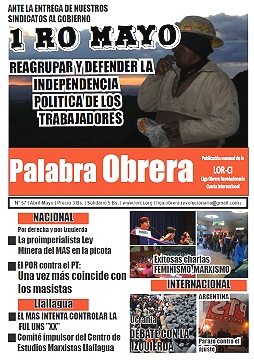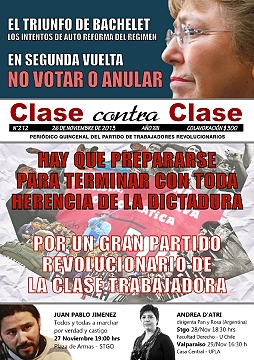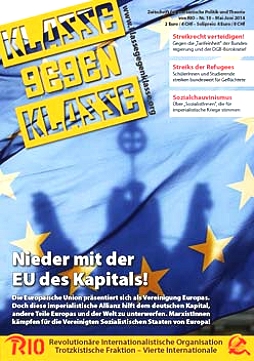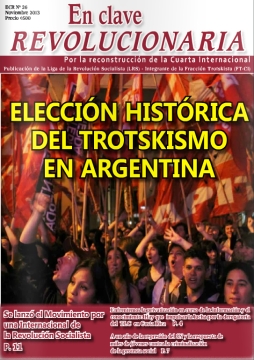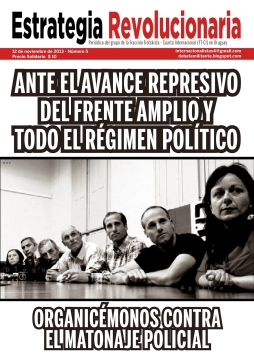Chávez proposes a “5th International”
04/01/2010
The 1st extraordinary Congress of the United Socialist Party of Venezuela (PSUV), meeting from 19-21 November and alongside which a heterogeneous “International Congress of Left Parties” was held, the scene chosen by President Chávez to make an unexpected call to those present: “call on the political parties and socialist currents to create the 5th Socialist International as a new organization equal to the challenges of our time, and which will become an instrument of unification and articulation of the peoples struggles to save this planet”.
Amongst those invited to join this were the “communist parties and social democrats of Asia and Europe, forces of national liberation of Africa and the Middle East, new left-wing parties like Die Linke (Germany), the Left Bloc (Portugal), the Left Party (France), and radical and left-wing forces from Latin America, some old like the Sandinista National Liberation Front (FSLN) and some new, like the MAS of Bolivia and, of course, the PSUV.” Vaguely “progressive” forces like the PT of Lula weren’t left out and neither representatives of rancid bourgeois parties like the Liberal Party of Colombia, the PRI of Mexico or the Argentinean Justicialists (Peronists).
Despite all this, Chavez’s call, in its way, has brought forth a crucial question: the contradiction that exists between the global character of the crisis and the unity of the attacks by imperialism and the bourgeoisie’s – despite their differences – to unload this onto the workers and peoples of the world, and the lack of an international pole which struggles to coordinate and unite the resistance of the masses on an international scale. Imperialist capitalism is a global system based on the tight interdependence between the global economy and international politics which will not fall under its own weight. It will need to be overthrown, and this task must be faced up to on an international scale. For this to happen we need an organization: a global party of socialist revolution, which unites internationally the struggles of the workers and the oppressed of the world.
In his call, Chávez referred to the history of the socialist and workers internationals: he recalled the first International Workingmen’s Association, amongst whose founders were Marx and Engels; the Second International based on the construction of mass unions and socialist parties in Europe at the end of the 19th Century; the creation of the Communist International of Lenin and Trotsky after the reformist defection of the 2ndm at the heat of the triumph of the Russian Revolution; and, finally, after its destruction as a revolutionary organization by Stalinism, the foundation of the 4th International by Trotsky and his comrades in 1938 to preserve the revolutionary heritage of Bolshevism and prepare the foundation for a new revolutionary international leadership.
In this way, Chavez’s speech, regardless of his intentions and the content of his political project, implied a recognition of and homage to Marxism and its history as the only current which, taking out all the logical conclusions of its analysis of capitalism and the class struggle, proposes in a serious way the need for an international revolutionary leadership, with a program, strategy and organization for this colossal task.
It is true that 70 years after the foundation of the 4th International, this no longer exists as a revolutionary organization with mass influence. Owing to the capitalist stabilization of the Second Postwar period (which distanced the most advanced countries with the most working class and socialist tradition from revolution), Stalinist, social democratic and nationalist hegemony over the workers movement and the revolutionary processes in the periphery, and the opportunist capitulation to these phenomena by many of its leaders after the assassination of Trotsky, the 4th international exploded and became a centrist movement – which is to say that it oscillates between revolution and reformism – with partial threads of continuity with the Marxism of Lenin and Trotsky.
Today, although there are numerous tendencies who claim its programme and its banner as their own, there is no true 4th International, not even the embryo of one in the form of a cadre organization with a proven program, to struggle for the reconstruction of a global party of socialist revolution which this historical stage calls for.
Does this mean that the conceptions and the program of the 4th International have been surpassed? We believe not, as they were forged in the time of great revolutionary events and counter-revolutions of the 20th century (the Russian, German and Chinese revolutions, the ascent of fascism, the conversion to reformism to of social democracy and afterwards of the communist parties, the Stalinist bureaucratization of the Soviet Union, etc.), group together the lessons of more than a century and a half of global class struggle and offer the only solid base in the face of a new cycle of “crisis, wars and revolutions”.
The theoretical and political advances express three fundamental problems of “principle”: the serious struggle for the politically independent organization of the working class, which due to its immense social force and position in production and economic and social life, is the best placed to lead a project of human emancipation; which means it can and must dispute with the bourgeois and petit-bourgeois currents - who encourage collaboration with the “democratic”, “nationalist” or “progressive” exploiters – hegemony over the broader movement of the exploited and oppressed of the countryside and the city, in order to consolidate a firm class alliance capable of defeating the exploiters and imperialism; and that this opens the road to workers and popular power based on the broadest democratic self-organization of the masses, in order to face up to the transition to socialism with workers democracy.
Now are these questions, which separate revolutionaries from reformists who propose to “humanize capitalism”, secondary today? Should we postpone them in order to build a new “broad international”, without class boundaries or a program? This reasoning is mistaken. We can and should unite in mobilization through the broadest forms of unity of action and the united front against imperialist, the capitalists and their governments, incorporating the most diverse sectors: peasants, indigenous peoples, movements of women, racially, religiously or sexually oppressed minorities and all progressive causes against war, for democratic rights or against the capitalist degradation of the environment etc. But this doesn’t mean diluting and mixing the political character and program of those who struggle for the working class to recuperate itself as a socially and politically differentiated subject and who see in socialist an historic alternative in the face of capitalist domination. It is a case of “hitting together and marching separately”. This, which is true on a national scale, is doubly and triply so on an international scale.
Today, more than a century and a half later, in the epoch of capitalist decline, it is impossible to build a solid workers international – which will not be a type of debating club useless for action – if it doesn’t begin with a common understanding of tasks, which is to say, a program founded on the lessons of the history of class struggle. The current crisis calls for a combative international, with a clear program to offer the working masses.
The “Fifth International” of Chavez would be the opposite: a broad grouping of old and new political apparatuses – many emptied of all real rank and file activism – which would include even governments at the head of semicolonial states (like those of the ALBA), sectors of old bourgeois nationalist movements who seek to cover themselves after decades of prostration before imperialism, and diverse populist and reformist currents and subordinated to these, the social movements, the anticapitalist youth and even some “trotskyists” are invited to join in, all around a nationalist discourse decorated with socialist and anticapitalist phrases to better serve a strategy of pressure and bargaining for concessions with imperialism and the bourgeoisies.
Not only because of the extreme heterogeneity of the currents who would form it and the confusion over ideology and objectives – which includes even encouraging trade between the signatories of such an agreement -, but rather, because of the fact that, fundamentally, it proposes to include political forced integrated or profoundly adapted to their respective national regimes and with a bourgeois or petit bourgeois social base, and therefore, organically incapable of seriously defending a common interest of the exploited above “their” respective states.
Far from being an adequate instrument to confront imperialism, Chavez’s Fifth International would be more like a “knife with no blade”, incapable of seriously confronting it or worse, could only follow a path of capitulations, frustrations and defeats at an international scale, like that marked by the nationalist, reformist and Stalinist leaderships in the preceding history. An example of this: neither Chavez nor his guests to build this supposed international were capable of organizing a campaign of mass mobilizations against the pro-imperialist coup in Honduras and in fact ended up covering for the electoral farce imposed by imperialism.
The fact is that at the end of the day, Chavez’s politics are nationalist and of negotiation with imperialism and of negotiation with imperialism and the Venezuelan capitalists, without breaking the limits of the bourgeois order which has nothing to do with the historical interests of the workers movement and socialism. In the face of economic difficulties and the disenchantment of the popular sectors in Venezuela, he wants to compensate with new massive doses of rhetoric of “21st century socialism” (looting the Marxist tradition in order to do so) with the Fifth International being just an extension of these methods onto the international terrain.
We will have to see if this farce of a “Socialist Fifth International” manages to get off the ground and in what conditions. For now it has received the adhesion of the “Bolivarian” tendencies and other currents, but the call hasn’t failed to embarrass some allies of Chavez, who see in his invitation a “bear hug” for their organizational survival – for example certain remnants of Stalinism and Maoism. The Cuban government has also until now been quite circumspect about the call.
On the other hand, some organizations who come from Trotskyism seem prepared to join, like the “United Secretariat” (which drives the NPA in France and is on a liquidationist course away from Trotskyist program and politics) who say that “this call creates the conditions for a new international discussion, inseparable from solidarity with the Bolivarian Revolution. It is in this spirit that the IV International, its organizations and its activists respond ‘presentes!’”, as François Sabado wrote anticipating the course of their next XVI International Congress.
But what we need is not to join a “Fifth International” in words and of nationalist conciliatory acts. On the contrary, we must advance in the reconstruction of the Fourth International as a combative international of the workers, winning for this task the working class and youth vanguard which awakes to political life and can input its energy, enthusiasm and revolutionary drive.
It is not a question of “number” or of dogmatism, but rather of defending the foundations with which the Fourth International was created and which today are the only programmatic, political and strategic response to the problems which the masses of the world face in the epoch opened in the 20h century: that of the decline of the capitalist and imperialist system.








